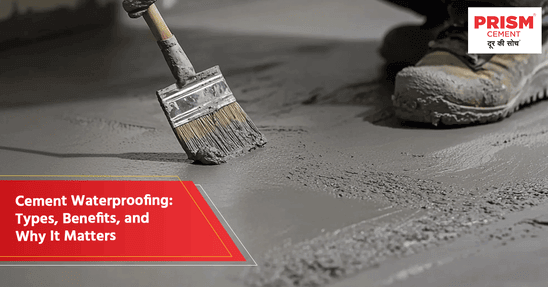
Waterproofing is a vital aspect of construction that ensures the longevity and durability of structures by preventing water damage. Among the many methods available, cement waterproofing stands out for its reliability, cost-effectiveness and versatility. Whether you're building a new home or upgrading an existing structure, understanding the importance of cementitious waterproofing is essential to protect your investment.
Cement waterproofing involves use of specialized coatings, additives or treatments to create a water-resistant barrier on concrete or masonry surfaces. These solutions, often a blend of cement, polymers and other materials, are designed to protect against water seepage, cracks and dampness. From waterproofing basements to concrete slab waterproofing, this method is widely used in construction to enhance the structural integrity of buildings.
The versatility of cementitious waterproofing makes it suitable for a variety of applications, including roof waterproofing, terrace waterproofing and slab waterproofing. It ensures that moisture doesn’t compromise the strength and appearance of your structure.
There are two main types of cement waterproofing, each with unique benefits and applications.
Polymer-modified coatings combine cement with polymers to improve flexibility and crack-bridging properties. This type of concrete waterproofing is ideal for areas prone to structural movement or minor vibrations. Common applications include terrace waterproofing, concrete roof waterproofing and areas exposed to harsh weather conditions.
This traditional method uses a mix of cement and water-repellent additives to create a robust barrier. Standard cementitious waterproofing is suitable for waterproofing basements, walls and areas with consistent exposure to moisture. It is easy to apply and offers excellent adhesion to concrete surfaces.
It protects structures from water damage, cracks and seepage, significantly increasing their lifespan. Whether it's concrete roof waterproofing or slab waterproofing, this solution ensures that your construction remains robust for years.
Unlike alternative methods, cementitious waterproofing is a cost-efficient solution. It combines affordability with long-term benefits, making it an ideal choice for budget-conscious projects.
By forming a water-repellent barrier, it prevents moisture ingress, which can lead to mold, dampness, and structural deterioration. This makes it essential for roof waterproofing and terrace waterproofing applications.
Modern cement waterproofing solutions, like Prism Cement’s Champion All Weather Cement, use environmental friendly materials and techniques. This not only protects your structure but also contributes to sustainable construction practices.
Water seepage and cracks compromise the strength of concrete over time. By using cement waterproofing, you enhance the structural integrity of your building, ensuring it withstands environmental stressors and remains beautiful.
Investing in cement waterproofing is not just about preventing water damage—it's about ensuring the safety, durability and beauty of your home or building. From waterproofing basements to concrete slab waterproofing, choosing the right solution can make all the difference.
Products like Prism Cement's Champion All Weather Cement come equipped with water-repellent additives, offering unmatched protection and helping you maintain the appearance of your home for longer.
FAQs
Cement waterproofing can last up to 10-15 years with proper application and maintenance.
It is typically done before plastering to ensure a solid, water-resistant base.
It usually takes 24-48 hours to dry, depending on the type and weather conditions.
Generally, OPC 43 or 53 grade cement is used for waterproofing, but premium products like Prism Champion All Weather Cement offer enhanced water-repellent properties.
Yes, it is highly effective for roof waterproofing and provides long-term protection against leaks and cracks.
Prism Cement a division of Prism Johnson Limited is one of India’s leading integrated Building Materials Company, with a wide range of products from cement, ready-mixed concrete, tiles and bath products.
Prism Johnson Limited is an IMS Certified Company (ISO 9001:2015, ISO 14001:2015, ISO 45001:2018,SA 8000:2014 & ISO 50001:2018). Quality assurance is an integral part of Prism Johnson Limited manufacturing philosophy. The strength and other characteristics are much higher than the BIS requirements. Excellent quality has placed Prism Cement in the premium price segment.
KNOW MORE305, Laxmi Niwas Apartments, Ameerpet,
Hyderabad - 500016, Andhra Pradesh
![]() Tel: +91-40-23400218
Tel: +91-40-23400218
![]() Fax: + 91-40-23402249
Fax: + 91-40-23402249
"Rahejas", Main Avenue, V.P. Road,
Santacruz (W), Mumbai - 400054,
Maharashtra
![]() Tel: +91-40-23400218
Tel: +91-40-23400218
![]() Fax: + 91-40-23402249
Fax: + 91-40-23402249